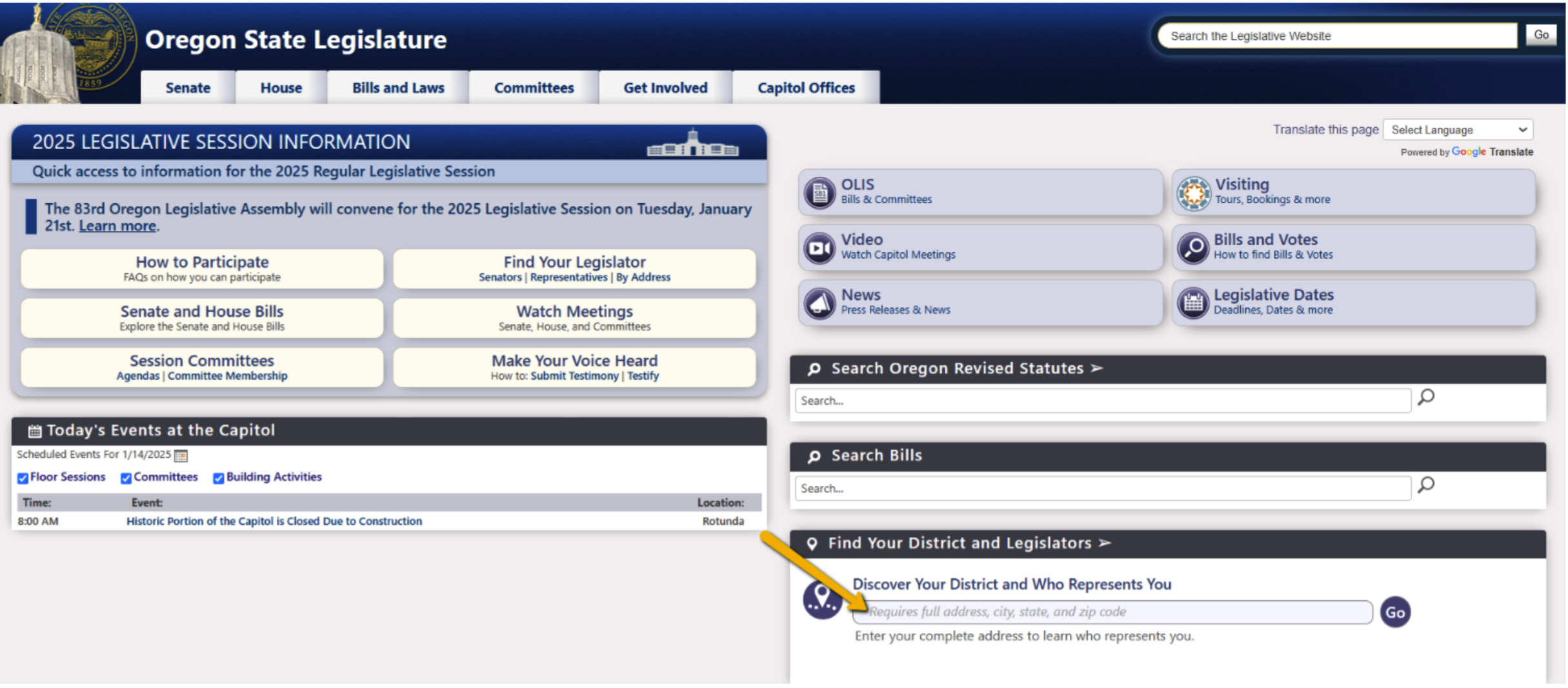
First, know who your legislative reps are!
Confirm who your legislative reps are by going to the Oregon Legislative website and typing in your full address in the lower right corner of the page as shown below:
Get to know each legislator through online content (their websites, their biographies, their committees, and their environmental and climate voting records via Oregon League of Conservation Voters scorecards, etc.).
How to follow a bill in the 2025 Legislative Session.
To learn more about a bill (sponsorship, committee assignment, actions, etc.) go to OLIS, The Oregon Legislative Information System:
- Scroll down to “Search Bills.” Enter the bill number and click (make sure to enter a space between the letters and number – for example, SB 88)
- On the new screen under “Filter Your Search” select “2025 Regular Session.” The new screen offers your options.
- Select the correct bill number (you might have to scroll down). The new screen is about the bill.
- You can read the overview, full text, analysis, amendments, and testimony. It also offers options to register and submit testimony.
What is lobbying? What do I need to know?
- When we advocate for specific bills, we are lobbying.
- When we inform and try to influence our elected officials’ actions and votes, we are lobbying.
- Our advocacy might include writing, calling, and visiting elected officials to share our perspectives and encourage them to take certain action.
- Lobbying by ordinary people is effective because officials know we are motivated to take the time to reach out. They also know we are not paid – and we vote. Our lobbying and advocacy show how deeply we care. Through lobbying, we educate, we build constructive relationships, and we also learn!
How to make sure your support is heard: Speak Up!
You’ve probably seen Action Alerts encouraging Third Actors to submit testimony supporting important bills that are under consideration by the Oregon State Legislature.
You might ask: “How do I testify?” “I’m not an expert. Why would they want to hear from me?”
Legislators hear from the “experts” and paid lobbyists, but all too often they don’t hear from us. In a democracy, elected officials care about what we think! We are experienced and our testimony can sway them!
Here’s how to get started: How to submit written testimony and provide oral testimony.
Some hints for effective testimony
Explain your position the same way that you’d explain it to a friend – in a simple, understandable, interesting, and compelling way.
- Explain who you are and why you care.
- What is the problem this bill can solve based on YOUR experience. Statistics have nothing on personal stories!
- Make a clear “ask”. Refer to the bill number, lead sponsor, and ask for their vote.
- Use talking points provided by Third Act or other organizations to help you write your testimony.
- When you submit written testimony, you provide contact details (these are not shared publicly). In your testimony, do not insert personal information that you do not want shared publicly (such as address, phone number, etc.).
Above all, be persuasive and respectful. Go to this webpage for How to Submit Written Testimony.
Oral Testimony: consider delivering your testimony in a hearing or a legislative visit.
- Count on having only 2 minutes. Time yourself! Your written testimony can be longer.
- Nervous? Say so! It humanizes you and breaks the ice. Everyone can relate!
- You can read your testimony but be sure to make eye contact with committee members.
- If you plan to speak, it is a good idea to write it out first. Consider giving the committee a written copy. (It can be longer than your oral testimony.)
Here are guidelines for how to provide oral testimony in Oregon.
This video by Washington State social studies teachers is a helpful introduction to providing testimony.
Let us know if you have questions, want help, or have suggestions! Write to us at Thirdactoregon@gmail.com
Watch Third Act Central’s How to Lobby webinar (Passcode: +J*30trN)